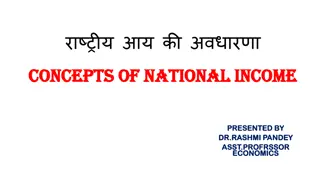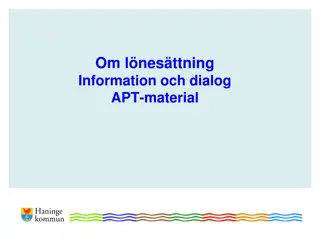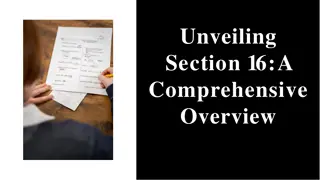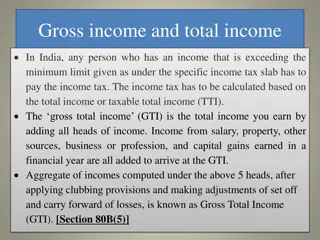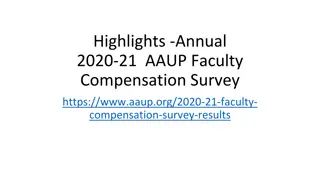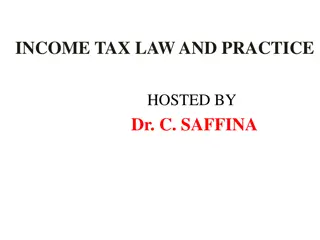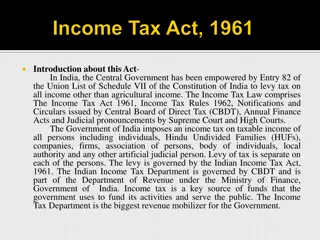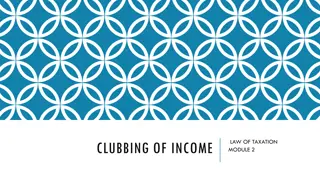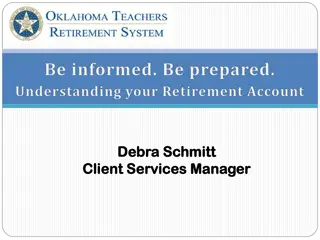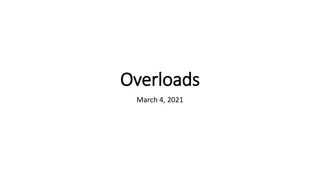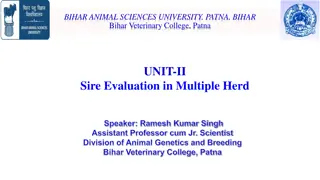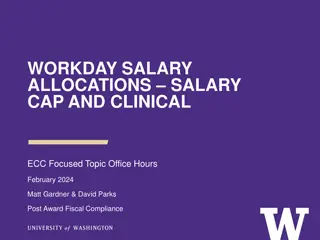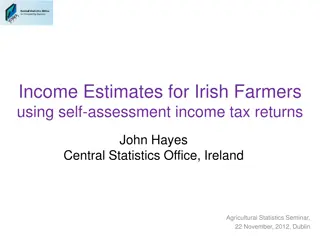
Understanding Computation of Income from Salary - Concepts and Deductions
Learn about the computation of income from the head of salary under sections 15, 16, and 17, including important concepts such as salary definition, employer-employee relationship, deductions, and allowances. Explore the inclusive definition of salary, deductions allowed under section 16, and the criteria for income to be taxed under the head of salary. Gain insights into the relationship requirements between employer and employee for income to be considered under the salary head.
Download Presentation

Please find below an Image/Link to download the presentation.
The content on the website is provided AS IS for your information and personal use only. It may not be sold, licensed, or shared on other websites without obtaining consent from the author. If you encounter any issues during the download, it is possible that the publisher has removed the file from their server.
You are allowed to download the files provided on this website for personal or commercial use, subject to the condition that they are used lawfully. All files are the property of their respective owners.
The content on the website is provided AS IS for your information and personal use only. It may not be sold, licensed, or shared on other websites without obtaining consent from the author.
E N D
Presentation Transcript
This is the first head of income. Computation of income from the head of salary described under sec. 15, 16 and 17. Before understanding the computation of income from salary, some important concept must be understood. What is salary, Employer and employee relationship, Deduction under this head, and Allowances?
Generally salary means Basic + D.A. but for the taxation it has a wider meaning, for this purpose Salary is define under sec. 17[1], there is given an inclusive definition of salary. Salary includes- Wages Any annuity or pension Any gratuity Any fee, commission, perquisites or profits in lieu of or in addition to any salary or wages. Any advance of salary Any payment received by an employer in respect of any period of leave not availed by him The annual accretion to the balance at the credit of an employee participating in a recognized provident fund, to the extent to which it is chargeable to tax The aggregate of all sums that are comprise in the transferred balance of an employee participating in a recognized provided fund to the extent to which it is chargeable to tax The contribution made by the central government in the previous year, to the account of an employee under a pension schemes referred to in sec. 80CCD. Note-Above said incomes are included in salary, but there are certain incomes, mentioned above, which are either fully exempted or exempt up to a certain limit. Hence aggregate of above incomes, after the exemptions available in this act, if any, is knows as gross salary.
the following three deduction, allowed under sec 16 1- standard deduction [sec. 16(1) 2- deduction for entertainment allowance [ sec. 16 (2) 3- deduction on account of any sum paid towards tax on employment [sec. 16(3) Note- The amount received at, after allowing the above deduction, is the income under the head of salary.
An income can be taxed under the head of salary, only if there is a relationship of an employer and employee between the payer and payee. If this relationship does not exist, then the income would not be deemed to be income from salary. The relation of employer and employee should be of master and servant. A master is one who not only directs what and when a thing is to be done but how it is to be done, and the servant is one who is bound to carry out the instruction given to him by such masters. For Instance- In case of a lecturer of a college who is also appointed vice principal of the college and receives vice principle allowance, the allowance would be taxed under the head of salary, because it is being received from the employer by the employee although for non academic work. However, if this lecturer sets the question paper of a university, the remuneration which he receives for setting the paper will not taxable under the head of salary, because the university is not the employer of the lecturer. Such remuneration would be, however, being taxable under the head of income from other sources .
A Member of Parliament or state legislature is not a Government employee and therefore, remuneration received by him is not taxable as salary, but as income from other sources. However, salary received by the minister in the government is taxable under the head of salary. Any salary, bonus, commission or remuneration due to or received by an assessee from a firm, in which he is a partner, shall not be taxable under the head salary , because there is no relationship of an employer and employee. It will however, be taxable under the head of profits and gains of business and profession .
Basis of charge- According to sec. 15- income shall be chargeable to income tax under the head of salary as following: A- any salary due from an employer or former employer to an assessee in the previous year, whether paid in that previous year or not B- Any salary paid or allowed to him in the previous year by or on behalf of an employer or a former employer though not due in that previous year or before it became due to him. C- Any arrears of salary paid or allowed to him in the previous year by or on behalf of an employer or a former employer, if not charged to income tax in any earlier previous year. C(a) - Arrears of the salary although salary is taxable on due or receipt basis whichever is earlier, but if there are any arrears of salary which have not been taxed in the past, such arrears will be taxed in that year in which these are paid or allowed to the employee. Note- if the salary is payable on monthly basis, it normally becomes due at the end of month although it is paid in the next month. In this case, it will be taxable on due basis because due is earlier than receipt. Therefore salary monthly is normally taxable from April to March because the salary on March becomes due at the end of the month. However, It is notable that, in some cases the salary becomes due on the 1stday of the next month, in that case we shall tax the salary from March to February, because salary of the month of march current year will be due only in the next financial year and the salary of the month of march of last previous year became due only on 1stApril of the current year.
An allowance is a fixed minatory paid by the employer to the employee for meeting some particular expenses, whether personal or for the performance of his duties. These allowances are generally taxable and are to be including in the gross salary unless a specific exemption has been provided in the respect of any such allowances. Types and Treatment of the Allowances: For the better understanding it can be divided into following categories; 1- House Rent Allowance-HRA [Section 10(13A) and Rule 2A] 2- Prescribed Special Allowances which are Exempt to a certain extent - Section 10(14) 3- Treatment of Entertainment Allowance 4- Allowances which are Exempt in case of certain Persons 5- Allowances which are Fully Taxable
Quantum of Exemption: Minimum of following three limits: Allowances actual received Rent paid in excess of 10%of salary 40% of salary (residence area in metropolitan it will be 50% of salary ) Note- : The exemption in respect of HRA is based upon the following factors: Salary Place of residence Rent paid HRA received Since there is a possibility of change in any of the above factors during the previous year, exemption for HRA should not always be calculated on annual basis. As long as there is no change in any of the above factors it can be calculated together for that period. Whenever there is a change in any of the above factors, it should be separately calculated till the next change
The above allowances shall be exempt either in full or upto a certain limit and the balance, if any, shall be taxable and thus included in gross salary. There are two types of it; (i)- Special Allowances for performance of official duties (ii) Allowances to meet Personal Expenses
These allowances are not in the nature of a perquisite within the meaning of section 17(2) and are specifically granted to meet expenses wholly, necessarily and exclusively incurred in the performance of duties of an office or employment of profit. These allowances will be exempt the extent such expenses is actually incurred for that purpose. [Section 10(14)(i)]. These allowances are: Travelling allowance: Daily allowance: Conveyance allowance: Helper allowance: Academic allowance: Uniform allowance: The above allowances shall be exempt to the extent of minimum of the following: Actual allowance received. Actual amount spent for the purposes of duties of office or employment.
These allowances are exempt to the extent of amount received or the limit specified, whatever less is: Children education allowance: Hostel expenditure allowance: Tribal area, Scheduled Area/Agency area allowance: Special compensatory hilly area allowance or high altitude allowance etc.: Border area, remote area allowance, disturbed area allowance, etc.: (as per given later): Compensatory field area allowance: Compensatory, modified field area allowance: Counter insurgency allowance granted to members of armed forces: Transport allowance: Underground allowance: High altitude (uncongenial climate) allowance: Special compensatory highly active field area allowance granted to members of armed forces: Island (duty) allowance:
This deduction is allowed only to a Government employee. Non-Government employees shall not be eligible for any deduction on account of any entertainment allowance received by them. In case of entertainment allowance, the assessee is not entitled to any exemption but he is entitled to a deduction under section 16(ii) from gross salary. Therefore, the entire entertainment allowance received by any employee is added in computation of the gross salary. The Government employee is, then, entitled to deduction from gross salary under section 16(ii) on account of such entertainment allowance to the extent of minimum of the following 3 limits. Actual entertainment allowance received during the previous year. 20% of his salary exclusive of any allowance, benefit or other perquisite. 5,000 The deduction shall be minimum of the above 3 limits.
In this respect these are: 1- Allowances to a citizen of India, who is a Government employee, rendering services outside India. [Section 10(7)] 2- Allowances to High Court judges under section 22A (2) of the High Court Judges (Conditions of Service) Act, 1954. 3- Sumptuary allowance given to High Court and the Supreme Court judges. Sumptuary allowances are in the nature of entertainment allowance. 4- Allowance received by an employee of United Nations Organisation (UNO) from his employer.
All other allowances excepting those discussed in above, are fully taxable. Some of such allowances are enumerated as under: Dearness Allowance (DA) City Compensatory Allowance (CCA) Medical Allowance: Fully taxable, irrespective of whether any amount has been spent on medical treatment or not. Lunch Allowance/tiffin allowance Overtime Allowance Servant Allowance Warden Allowance Non-practicing Allowance Family Allowance

